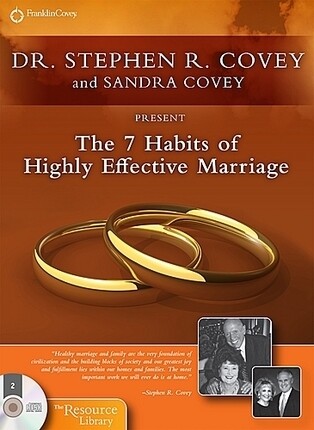This article originally ran on LDS Living in 2015.
The best way to predict your future is to create it.
-Stephen R. Covey
Successful marriages don’t happen by accident; they take planning and talking and effort. Here are some important tips from the Bytheways that will save you a little stress and frustration as you keep working towards a celestial marriage.
1. Assume good intentions.
Sometimes we hurt each other’s feelings without meaning to. When two people get together from different families and backgrounds and try to live together, that’s inevitable. Early in our marriage, we came to an understanding that has helped us a great deal: We promised that we would never intentionally hurt each other’s feelings, and then we promised that if we ever did feel hurt, we would remind ourselves of that commitment. . . .
It can be so easy to get offended unless you remind yourself that you are both trying to make a happy marriage, and that neither of you really wants a hurt or angry spouse. You may find, too, that when you try to overlook the little things before you get offended, you can avoid a lot of problems.
2. Use these handy communication tools.
We’d like to share a couple of tools that have helped us immensely in this aspect of our marriage. When we’re trying to make a decision together about what we should do, we use the number rating system. . . .
This is how it works: Let’s say we’re trying to decide what to do for our Friday date night. One of us might say, “Do you want to see a movie tonight?” Instead of choosing between “yes” or “no,” we use the rating system. John might say, “Oh, I’m about a four on that one,” and Kim might say, “I’m about a six.” Which means we’ll start all over again and come up with another idea that we both give a higher rating.
The rating system helps us communicate what we really want without having to guess about our partner. This way we don’t end up doing things together that neither one of us really wants to do!
3. Listen with meekness, not sulkiness.
Stephen Covey has written, “Unexpressed feelings don’t die. They are buried alive and come forth later in uglier ways. People who over and over again take the martyr role gradually build internal resentments and hostilities which eventually surface” (Truman G. Madsen and Stephen R. Covey, Marriage and Family: Gospel Insights [Salt Lake City: Bookcraft, 1983], p. 175).
We believe that, more important than all the communication techniques we could share, the main thing you need is simply the willingness to listen. That willingness to talk about problems, to look at them honestly and try to solve them, might be called meekness. Remember that when Jesus said to the apostles, “one of you shall betray me,” they all asked, “Is it I?” (Matthew 26:21–22). That kind of meekness and introspection will help you as you encounter these speed bumps on the road to marital bliss. If your spouse seems to feel betrayed, you might ask, “Is it I?” or, “Is it something I did?” . . .
4. Learn to put your new family first.
While you will always be a member of the family into which you were born, you have now assumed a more important role that must be your first priority. You are now a husband or wife more than anything else. That has to take first place. . . .
There are some things within a marriage that are very personal and shouldn’t be shared with extended family members. It’s important that both spouses feel emotionally “safe” within the marriage, free to be themselves, even with all their quirks. Spouses need to try to be completely loyal to one another, and not spend every night on the phone telling their parents the latest crazy thing the other one did that wasn’t the way their own family used to do it.
5. Don't nag. Do praise.
Being overly critical probably hurts more than it helps. We doubt that anyone is ever criticized into changing. On the other hand, many people have been loved into changing. . . .
Some may believe that their job is to help their spouses become more than they are, and that’s true. But what may be intended as encouragement for the future can sound like complaining in the present. For example, if a wife is constantly telling her husband all that he “could” be doing, or all that he “should” be doing, she may sincerely believe she’s being the “good woman” pushing her husband to greater heights. However, the husband may begin to think, “No matter what I do, it’s not good enough." . . . Most men want in marriage is to be admired and appreciated.
6. Say "I love you" in your spouse's language.
John says: I used to think that keeping cars clean and running smoothly sent a powerful “I love you.” I have learned that, although auto maintenance is greatly appreciated, Kim prefers vegetation and words (flowers and notes). My opinion of flowers is that they’re very pretty at first, but in three days they’re
dead. But what I think is not important in this case. If I want to say “I love you” in Kim’s language, colorful and aromatic flora is the way.
7. Remember money matters.
Part of marriage is relocating. It’s a little ironic, but people usually start out marriage with brand- new china, silverware, and matching glassware in an old, worn-out basement apartment. For some, the adjustment isn’t difficult, and they can turn any apartment into a home.
Others may feel forever uncomfortable until they catch up with their parents’ lifestyle. They see Mom and Dad and maybe some of their siblings with new cars and computers, living a Martinelli’s lifestyle, and they may try to match it on a Kool-Aid income. . . .
[But] President N. Eldon Tanner gave some wonderful financial advice years ago in general conference. His five main points were: (1) pay an honest tithing, (2) live on less than you earn, (3) distinguish between needs and wants, (4) develop and live within a budget, and (5) be honest in all financial affairs (see Ensign, November 1979, pp. 81–82). . . .
As in every other area of your marriage, when it comes to money, the main thing is to communicate. Talk about and agree on your financial goals, and then make a commitment to be disciplined about spending limits.
8. Remember to build all areas of intimacy.
Speaking for ourselves, once we were home from the honeymoon and back into a normal telestial routine, we reflected on how quickly something that had once been “no, no, no” became “go, go, go.” Because Latter-day Saint youth have all heard so many cautions about dating and chastity, some get the impression that sex is bad and unspeakable.
One of the best pieces of pre-honeymoon advice we received was from an old friend who strongly recommended we read a book called The Act of Marriage by Tim and Beverly LaHaye. This book is thorough and specific, and was written in a reverent spirit by committed Christians. It handles specifics about anatomy and male and female response that we couldn’t find in any other book we read. We read it together during the final weeks of our engagement. (We agreed not to make eye contact while reading because of our frequent blushing.) . . .
In your intimate relationship, just like in everything else in your marriage, the things you want to accomplish together will take time, understanding, and effort. . . . For those first few days after your wedding, the pressures of school and work are left behind. It’s a wonderful time to forget about the world and just get to know one another. Once you’re back home, absorbed in the complicated pursuits of life, you have to find time to re- create the honeymoon magic. One of the things we learned is that intimacy is not just a physical thing, although we often use the word to mean just that. The sexual aspect of intimacy is only a small part of the experience, especially for women.
Finally! a book about physical intimacy and marital ONEness that is comprehensive, in-depth, reverent, and frank. And They Were Not Ashamed: Strengthening Marriage through Sexual Fulfillment is the ultimate how-to handbook — power-packed with hope and help for creating a mutually fulfilling intimate relationship. This three-in-one book has all you could want from a "marriage book," "sex book," and "parenting book."
9. Live with the gospel in your marriage.
We’ve found that one of the greatest joys of married life is praying together, studying scriptures together, and attending the temple together. These things, when done consistently, allow Christ inside to bless our marriage. These practices are critical in the first year of marriage (and vital for all the years that follow) for a couple of reasons. First of all, you begin a pattern for the rest of your marriage. Second, it’s much harder to feel resentment or unkind feelings toward your spouse when you’re on your knees together at the end of the day. It’s wonderful to be able to thank your Father in Heaven for your spouse and express your love for your partner when he or she is kneeling beside you. . . .
10. Remember your covenants.
You kiss and make up after a disagreement not just because you love your spouse but because you’ve made a covenant to love your spouse. Sure, love is a feeling, but it’s also a choice, a commitment, and a covenant. . . .
A “temple marriage” indicates a location, but a “celestial marriage” indicates a quality. Your marriage may have been performed in the temple, but only the Lord can make it celestial. The greatest thing you can do for your marriage is be committed to the Lord and his gospel. It’s not just about having an eternal perspective or remembering the plan of salvation. The plan of salvation is your marriage. It’s your personal plan of salvation. Your exaltation is impossible without it. That’s why it deserves so much attention and continued effort.
We’re encouraged by this quotation from President Spencer W. Kimball: “While marriage is difficult, and discordant and frustrated marriages are common, yet real, lasting happiness is possible, and marriage can be more an exultant ecstasy than the human mind can conceive” (Teachings of Spencer W. Kimball, pp. 305–6).
President James E. Faust expressed a similar feeling this way: “Happiness in marriage and parenthood can exceed a thousand times any other happiness” (Ensign, November 1977, p. 11).
For more great newlywed advice, check out What We Wish We Would Have Known As Newly Weds at deseretbook.com.




